

Traité sur la Charte de l'Energie (TCE) Coronavirus : La COP26 qui a été repoussée se tiendra finalement en novembre 2021 - 29/05/2020. La COP26, jugée cruciale dans la lutte contre le changement climatique et qui devait se tenir en novembre 2020 à Glasgow, a été repoussée d’un an, en raison de l’épidémie de Covid-19.
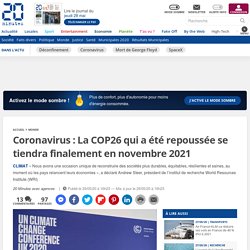
Ce nouveau report d’un grand rendez-vous pour l’environnement a été demandé par le Royaume-Uni, avait fait savoir l’ONU ce mercredi. Cette demande a été validée jeudi et la 26e Conférence des Parties se tiendra du 1er au 12 novembre 2021, selon le compte Twitter de la COP26, en concertation avec la Convention cadre des Nations unies sur les changements climatiques (UNFCCC) et l’Italie, partenaire de ce sommet. Elle avait été repoussée sine die dès avril. Deux cents chefs d’Etat attendus Selon le journal britannique The Guardian, il a été imaginé pendant un temps « que le sommet pourrait être convoqué dans les trois premiers mois de 2021 ».
A landmark lawsuit against Big Oil is back from the dead. Zombies can rise from the dead and apparently climate lawsuits can, too.
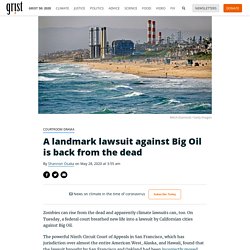
On Tuesday, a federal court breathed new life into a lawsuit by Californian cities against Big Oil. The powerful Ninth Circuit Court of Appeals in San Francisco, which has jurisdiction over almost the entire American West, Alaska, and Hawaii, found that the lawsuit brought by San Francisco and Oakland had been incorrectly moved from state to federal court before it was dismissed back in 2018. The cities claimed that ExxonMobil, Chevron, Shell and other fossil fuel companies knew about climate change for decades and sued the oil giants for financial support to create an “abatement fund” that would help pay for sea walls and other infrastructure projects. Judge William Alsup shot down that case two years ago, saying that the courts were not the right place to adjudicate the global problem of climate change. It’s official: The 2020 Atlantic hurricane season is going to be bad 2020-05-23. A hurricane is the last thing the country needs right now as tens of millions of Americans stay at home to protect themselves from COVID-19.
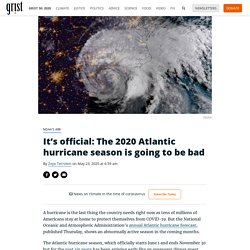
But the National Oceanic and Atmospheric Administration’s annual Atlantic hurricane forecast, published Thursday, shows an abnormally active season in the coming months. The Atlantic hurricane season, which officially starts June 1 and ends November 30 but for the past six years has been arriving early like an overeager dinner guest, typically produces 12 named storms.
This year, NOAA is forecasting between 13 and 19 named storms, six to 10 of which could become hurricanes (compared to the average six). Forget planting trees. This company is funding 4 far-out carbon removal projects. Last August, a San Francisco–based tech startup called Stripe made a bold climate promise.
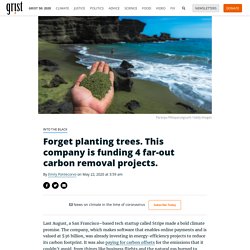
The company, which makes software that enables online payments and is valued at $36 billion, was already investing in energy-efficiency projects to reduce its carbon footprint. It was also paying for carbon offsets for the emissions that it couldn’t avoid, from things like business flights and the natural gas burned to heat its offices. But Stripe wanted to go even further to take action on climate change. The company announced it would spend an additional $1 million annually on emerging carbon removal technologies, bringing its carbon balance sheet into the black. The announcement kicked off a vetting process in which Stripe solicited proposals and consulted with scientists to evaluate them. Though the amounts are small, the gesture is huge. Comment les bourdons incitent les plantes à fleurir plus tôt en attaquant leurs feuilles 22/05/2020.
Naomi Klein and Arundhati Roy Help Launch Global Green New Deal Project With Worldwide Invitation. Authors Arundhati Roy and Naomi Klein took part in a virtual conversation on Tuesday to help launch a Global Green New Deal project to foster internationalism and visualize possibilities for a new and better world for people and the planet.

The online event, entitled "Into the Portal, No One Left Behind," was co-sponsored by The Leap, War on Want, and Haymarket Books. Asad Rehman, executive director of War on Want, moderated the discussion. "We knew our system was broken. But the Covid-19 pandemic has reinforced the cruelty of the global economy, and deepened the visceral injustices of our societies," organizers said in the conversation's event description. "The time to build the future we deserve is now, and international solidarity is the tool we need to begin its construction. " Soutien au secteur ferroviaire : le Gouvernement déraille Saving Chaco: As coronavirus consumes New Mexico, drilling threatens sacred land. The COVID-19 pandemic has overwhelmed tribal communities in New Mexico, where Native Americans comprise about 11 percent of the state’s population but a staggering 56 percent of its recorded COVID-19 cases.
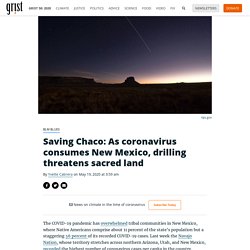
Last week the Navajo Nation, whose territory stretches across northern Arizona, Utah, and New Mexico, recorded the highest number of coronavirus cases per capita in the country, surpassing New York and New Jersey. It is against this backdrop that the U.S. Department of the Interior’s Bureau of Land Management (BLM) just moved forward with its decision to hold a series of meetings to gather public input on a controversial oil and gas drilling plan for the Greater Chaco Region, a culturally and spiritually significant area for the Pueblo and Navajo peoples of northwestern New Mexico. Local tribes were heavily involved in the public input process until the novel coronavirus hit. Now they say that it’s shortsighted and reckless for the agency to plow ahead with the comment period. Dans 50 ans, une chaleur invivable pour 3,5 milliards de personnes. Des migrations, des murs, la mort… Crédit Photo : Wikimedia Commons Ian Angus Quel est le danger du réchauffement climatique ?
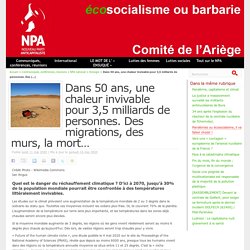
D’ici à 2070, jusqu’à 30% de la population mondiale pourrait être confrontée à des températures littéralement invivables. Les études sur le climat prévoient une augmentation de la température mondiale de 2 ou 3 degrés dans le scénario du statu quo. BlackRock : Arrêtez de financer la crise climatique ! Replay Science grand format - Le génie des arbres - France 5. Signez la lettre ouverte pour un plan de relance vert. Climat et dividendes, l’argent du chaos 7 mai 2020. Le système néolibéral, moteur de la crise écologique et sociale La crise du coronavirus va « changer la nature même de la mondialisation dans laquelle nous vivons depuis quarante ans […] Personne n’hésite à faire des choix profonds et radicaux quand c’est une question de vie ou de mort.

C’est la même chose avec le risque climatique ».